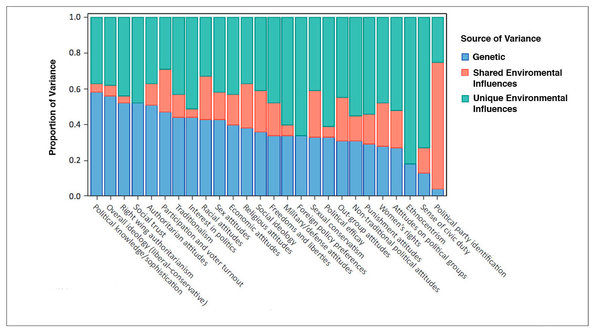Are Our Political Beliefs Encoded in Our DNA?
Thomas B. Edsall, New York Times, October 1, 2013
In December 2008, The New York Times Magazine reported on the emerging science of “genopolitics.”
“For years,” Emily Biuso wrote,
scholars have assumed that a voter pulls the lever because she grew up in a voting household or perhaps sat through a lot of civics classes. But this year two political scientists published studies claiming that in addition to environment, genes may be a primary influence on political engagement.
Biuso was among the first to talk about what has become a bitter dispute within the study of politics, a dispute in which the stakes are high and the potential consequences significant.
On one side of the debate are those like James Fowler, a professor of medical genetics and political science at the University of California, San Diego, and Darren Schreiber, a political scientist at U.C.L.A who point out, in a 2008 article in Science, that
In the past 50 years, biologists have learned a tremendous amount about human biology and its genetic basis. At the same time, political scientists have been intensively studying the effect of the social and institutional environment on political attitudes and behaviors. However, biologists and political scientists have been working largely in isolation of one another. Little cross-disciplinary work has been done.
The authors go on to argue:
This must change for two important reasons. First, recent evidence is making it increasingly clear that genetic variation plays an important role in explaining variation in human political behavior. Second, additional evidence in neuroscience indicates that the human brain may be adapted particularly to solve social problems that are explicitly political. Much of this evidence is associational, and we therefore should be cautious in using it to build causal theories. However, if the need for sophisticated social cognition drove the evolution of the human brain then a new science of human nature will require comprehending human biology in a sociopolitical context.
Representing the other side of the debate are Evan Charney at Duke and William English at Harvard, who contend that “genopolitical” analyses produce “absurdly high estimates of heritability of behavior.”
In an e-mail, Charney wrote:
“Genopolitics,” uninformed by some of the most important developments in molecular genetics and evolutionary biology over the past fifty years, is the modern day equivalent of phrenology.
Working somewhere between the two extremes are political scientists who are engaged in innovative, if more traditional, research. In the spirit of inquiry, I e-mailed a few more mainstream professors of government to get their opinion about this new line of scholarship.
Alan Abramowitz of Emory responded cautiously:
I’m sure genetics is a factor in shaping our political and social views but I think that it’s very difficult to separate the influence of genes from that of the family, the community and the social environment in general.
Gary Jacobson, of the University of California, San Diego, wrote in an e-mail:
These are serious, competent, careful researchers, and they are engaged in a valid research enterprise. The evidence that there is a genetic influence on some attitudes and behaviors seems quite strong.
Peter K. Hatemi, a professor of political science, microbiology and biochemistry at Penn State, is a leader in the field of genopolitics. Writing with 16 colleagues in a forthcoming paper, Hatemi summarizes results from “analyses of a combined sample of over 12,000 twins pairs, ascertained from nine different studies conducted in five Western democracies (Australia, Hungary, Denmark, Sweden, and the U.S.A.), sampled over the course of four decades”:
We provide definitive evidence that heritability plays a role in the formation of political ideology, regardless of how ideology is measured, the time period or population sampled.
In a carefully worded conclusion, Hatemi and his collaborators make it clear that their findings should not be over-interpreted or used to draw causal linkages.
The findings suggest that while genes undoubtedly matter in the aggregate development of political attitudes, individual common variants will have small effects on ideology. Hunting for a single “political gene” is a fruitless endeavor, and we make no such attempt here. Rather, by attempting to identify the countless specific genetic variants of small effects, related to ideology, we hope to uncover and unite larger neurobiological pathways which account for a substantial portion of how ideologies are formed and maintained in a world where both genes and environment interact and remain in continuous dialogue to guide human behavior.
Some of the outcomes of genopolitical research are intriguing. Late last year Hatemi and Rose McDermott of Brown University published “The Genetics of Politics: Discovery, Challenges and Progress.” Their paper includes a chart — “Summary of relative genetic and environmental influences on political traits,” reproduced here in Figure 1 — which is based on “findings from all reported twin and kinship studies which provided estimates of genetic and environmental influences on political traits from 1974-2012.” The chart illustrates the authors’ estimate of the relative proportion of genetic (purple) and environmental (green) influences, and the level of combined (brown) genetic and environmental influences.
{snip}
















